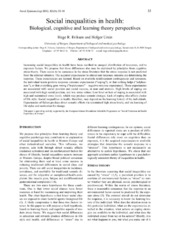Social inequalities in health: biological, cognitive and learning theory perspectives
Peer reviewed, Journal article
Published version
Permanent lenke
https://hdl.handle.net/1956/1896Utgivelsesdato
2002Metadata
Vis full innførselSamlinger
Sammendrag
Increasing social inequalities in health have been ascribed to unequal distribution of resources, and to exposure factors. We propose that these differences also may be explained by principles from cognitive stress theory. There seems to be consensus in the stress literature that the stress response is not predicted from the external situation. The acquired expectancies to stimuli and response outcome are determining the response. These expectancies are learned. Based on available reinforcement contingencies and resources, the individual learns positive response outcome expectancies (“coping”), or that nothing helps (“helplessness”), or that everything goes wrong (“hopelessness” – negative outcome expectancy). These expectancies are associated with social position and social success, in man and animals. High levels of coping are associated with high social position, and low stress values. Low level or lack of coping is associated with high and maintained stress levels, which may produce somatic changes. Lack of coping also affects choice of life style. Social inequalities in health, therefore, may depend on the learning history of the individuals. Expectancies of failure produce direct somatic effects via maintained high stress levels, and via learning of life styles and motivation for change.
